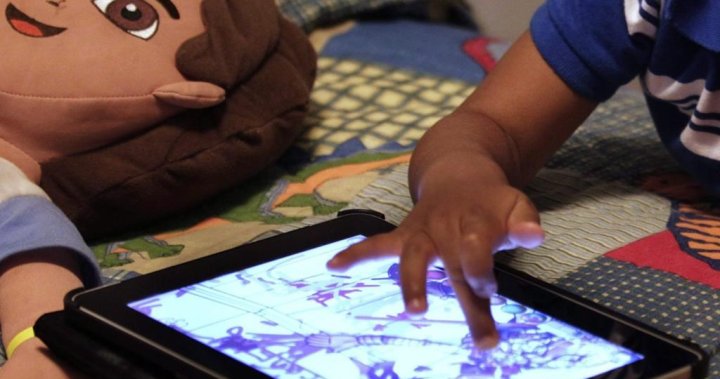Navigating kids’ social media use is a complex issue in the modern day of parenting, and something parents may be grappling with as they decide whether to gift their children smart devices this holiday season.
As Black Friday kicks off, experts say parents should be mindful about how they introduce their children to the digital world so that they develop healthy practices.
Matthew Johnson, director of education for MediaSmarts Canada, says what’s most important to know when it comes to introducing kids to the online world is how influential parents are in children’s real and digital lives.
“Even for teens, they rely on us. Kids don’t want us spying on them, they don’t want us looking over their shoulders. But they do want to know that we have their backs,” Johnson told Global News.
“That applies when it comes to media and technology as well. We need to have an ongoing conversation with (our kids) and we need to make sure that they feel they can come and talk to us about whatever issues they’re dealing with online or offline.”
Before making the financial leap, Johnson advises parents to think deeply about whether their child even wants a smart device.
“It’s a bit of a myth … that kids are asking their parents for smartphones. Our research found that almost two-thirds of kids got their first phone not because they asked for it for any reason, but because their parents gave it to them, because the parents wanted to stay in touch with their kids,” he said.
Johnson says parents should think about whether their child is ready to use a device independently with very little supervision, and whether they’re ready to deal with the constant distraction of having a smartphone in their pocket.
A smartphone or tablet also brings with it access to social media platforms. The social media landscape is changing rapidly, especially in the mode that it is consumed, Johnson says. It now takes place almost exclusively on mobile devices.
“What we are seeing that’s really different in the last few years, of course, is that it’s now a mobile-first experience. Nowadays, desktop and laptop computers, internet browsers, these are things that kids use almost exclusively at school or for schoolwork or sometimes when they’re doing research for personal interest,” he said.
MediaSmarts research conducted during the pandemic found that nine in 10 Canadian children aged 13 or older have an account on at least one social media platform.
In July, UNESCO pushed for classrooms around the world to ban smartphone use, arguing that the devices distract from learning, are bad for students’ mental health and well-being and come with a host of privacy concerns for young people’s data.
Johnson says if parents do purchase a smart device for their child this season, one piece of advice is to set household rules around technology and media use.
“Our research has consistently shown that having rules in the home is connected to how kids actually behave when they’re using digital devices,” he said.
Having technology and media rules in the home is connected with lower rates of cyberbullying, making in-app purchases without permission and accessing inappropriate online content, Johnson says.
It’s also important that the rules are not punishment-based because teens, especially, do not respond well, he says. Instead, the rules should be more of a contract where parents communicate what they expect from their child.
“If kids are getting a new device or a social network account, you could say that you’re not going to spy on them unless they’ve given you a reason not to trust them and that if they do, you’re going to be open about it,” Johnson said.
Part of the contract can also be how parents pledge to follow device rules, he says. For instance, if one rule in the contract is to keep phones away at dinner, then parents should model that as well.
Johnson says the most important rule in the contract should be ensuring your child knows they can come to you if something goes wrong.
“Your pledge on the other side as a parent is that you’re not going to freak out…. You’re going to listen calmly, you’re going to help them deal with it,” he said.
Parents should also teach their kids to curate who they’re communicating with online, which isn’t always on social media, Johnson says.
For video games, Johnson suggests ensuring kids don’t use in-game chat rooms to talk to their friends and opt instead for another channel, such as FaceTime or Messenger Kids. That way they aren’t exposed to people they don’t know.
Johnson says one of parents’ biggest fears when introducing their child to social media, based on MediaSmarts surveys, is misinformation.
One way parents can tackle this is by introducing their children to reliable online sources and fact-checking tools early on. Johnson suggests using Snopes or the Associated Press Fact Check.
Dr. Shimi Kang, a psychiatrist with Future Ready Minds, also says misinformation online is something to be cautious about.
“Young people are living online,” she says.
When it comes to helping your child safely navigate the online world, Kang suggests parents stay “shoulder to shoulder” with them as they would in real life.
“Ask them what they’re watching, who they’re following. Where are they getting their information? And really be open, curious so that we don’t scare them off,” Kang told Global News.
Kang says parents should slowly introduce their kids to smart devices before gifting one of their own. A good way to do that would be by first letting them borrow your phone so you can take it back at any time.
Like learning to drive, Kang suggests getting kids used to managing group chats and surfing the internet before they get on the highway, which is social media.
“I use the metaphor of a dolphin. Don’t be a jellyfish parent and just hand them the phone…. Don’t be a shark and say ‘no access’ because they do need it and behaviours will go underground. Be like a dolphin, shoulder to shoulder, firm with rules and expectations on how to use it,” she said.
Parents will have a good sense that their child is ready to use social media if they have good coping mechanisms and show competency in time management and real-life socializing, Kang says.
Kang says the modern online world is extremely powerful, but not good or bad. Rather, what matters is how we use it.
“I call technology the fire of our time. We don’t let kids play with fire. We teach them and they have to be the right age. So just like our ancestors harnessed the power of fire, those who did it well went further and farther than ever before. Those that didn’t do it well got burnt and burned down the village,” she said.
“I see all kinds of behaviours online that families and schools would be horrified if they happened in real life. But there’s this sense of being anonymous and the young brain doesn’t understand long-term consequences.”




